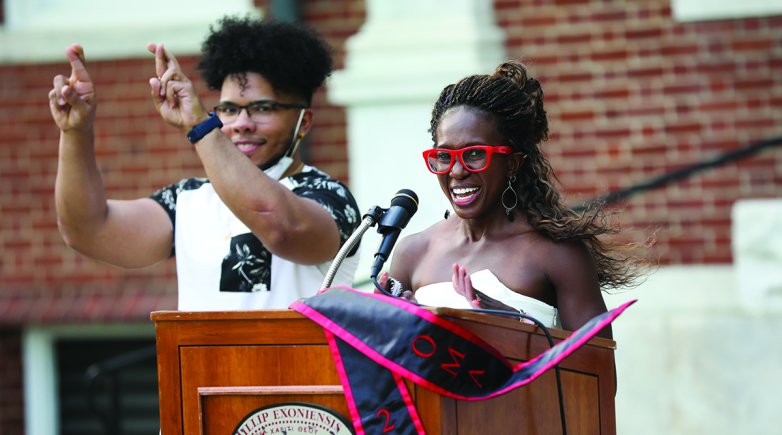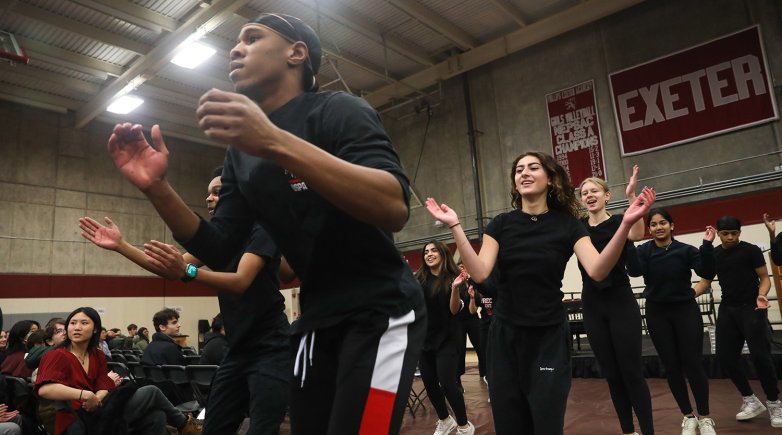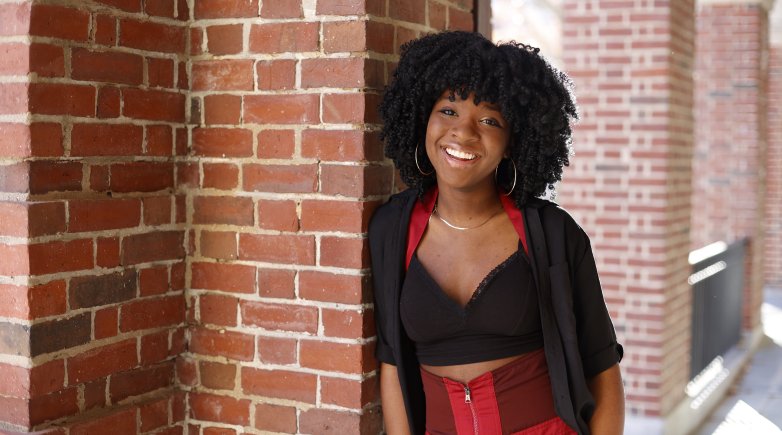'Educate the Educators' visits PEA
Students discuss activism and strategies for diversity, equity, inclusion and justice in and out of the classroom.
Four student panelists, including two students from the Academy and two from local high schools, spoke from the Assembly Hall stage on Wednesday night about their own activism and how educators in New Hampshire can help foster diversity, equity, inclusion and justice (DEIJ) inside and outside the classroom.
The event was the third iteration of “Educate the Educators” series hosted by the Black Lives Matter Seacoast Youth Division in collaboration with the Portsmouth High School Equity Council, and the first held in person at the Academy. Moderator Kevin Pajaro-Mariñez, the Academy's assistant director for equity and inclusion, is also co-director for the Racial Equity Educator team at BLM Seacoast and interim director of the organization’s youth division.
“Oftentimes…the perception is that what happens at Phillips Exeter is reflective of what happens down the street,” Pajaro-Mariñez said in his introductory remarks. “From my knowledge and my experience in the community, that tends to not be the case, and part of bridging that gap is to bring people together in conversation over important topics."
The discussion kicked off with reflections on what youth activism meant to all four of the student panelists. Janaya Springer, a senior at Portsmouth High School, and Saniyah Bolton, a junior at Exeter High School and co-director of the BLM Seacoast Youth Division, spoke of their experiences living in predominantly white communities in seacoast New Hampshire, and how each of them were inspired to join (and start) organizations dedicated to racial justice efforts.
“What youth activism means to me is having conversations and listening fully to everyone's opinions on issues that are considered or were considered taboo,” said Springer, who co-founded Portsmouth school district’s Equity Council in 2021. “These are real issues and if you just push it under the rug…it becomes even more of a problem for the marginalized communities who have to deal with the sweeping under the rug."
The panel moved on to discuss the issues related to diversity, equity, inclusion and justice they believed needed to be addressed in the classroom, especially in light of legislation like New Hampshire’s “divisive concepts” law, which effectively limits discussions of race and racism in public school classrooms.
"[Representation] is one of the foundational blocks to make ensuring that everyone in any community is feeling seen and that everyone...has the resources they need to create empathy,” said Rowan Flanagan '24, who works closely with the Office of Multicultural Affairs through clubs and affinity spaces and as a proctor.
“While lack of representation and DEIJ in schools and our institutions clearly harms people of color and other people with marginalized identities…it also harms those with privileged identities,” said Yasmin Salerno ’23, who is also a co-director of the BLM Seacoast Youth Division. “Because those with privilege growing up in a society that continuously stereotypes them as superior in some way creates a distorted sense of self that becomes a breeding ground for microaggressions…harms the potential for social relationships with marginalized peoples and feeds into a lack of empathy.”
Bolton suggested that teachers worried about the “divisive concepts” law let their students take the lead in activities and conversations around more controversial subjects. “Creating a more inclusive environment…would open up communication in general between students and teachers,” she said. “Those connections will guide that ability…to have that personal standpoint of not only acknowledging ‘hey, maybe I'm not too educated on this, let's talk about it,’ but also, ‘I've experienced this, let's talk about it as well.’”
Click here to watch the "Educate the Educators" event.
Before answering questions from the audience, which included a number of teachers from local public schools, the panelists spoke about how they cared for themselves while doing the difficult work of activism.
“When I first started out…I had this ideology that I was indeed going to save the world and become president of the United States at the same time,” Springer said with a laugh. “Having that mentality is very draining because you put so much pressure on yourself to solve every single issue, every single problem that we as a society face. But I think taking a step back and looking at the little progress you're making in communities and hosting panels like this — that's what's going to change the world, slowly but surely.”


